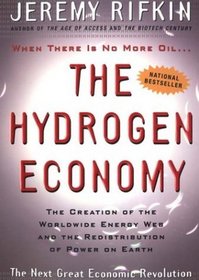Written in 2002 Rifkin's book is still relevant. Some of the dates are off, but his general thesis and time frames are still correct. Rifkin thought that we would have Hydrogen Fuel cars by the end of 2010 (We do have one assembly line, mass produced Hydrogen Fuel Cell Car, Honda FCV and commitments by 8 major car makers to have Hydrogen Fuel cell cars mass produced in 2015. That is just four years away from the writing of this review.)
Rifkin goes into detail how we have used the main form of energy from the 1700's and before (wood), 1800's (coal), and 1900's (oil). He also gives and interesting perspective of the middle east and why western civilizations have the scientific ability to innovate over Muslim civilizations.
Rifkin believes in peak oil and that hydrogen will be our fuel source in the future. Hydrogen is great once we work out the details on how to generate it in mass quantities without releasing greenhouse gases. Advances in solar energy and fuel cell technology are occurring and the hydrogen economy, now in it's late developmental stage will take off exponentially as we replace oil with hydrogen.
Long-term, we will have to rethink generating electricity from centralized power plants. At some point in the future, as Rifkin points out, we will have 200 million Hydrogen Fuel Cell cars on the road. When this happens, the cars not in use can be used to generate electricity and "uploaded" to the power grid. 200 million fuel cells would generate four times the energy we use currently. Not eliminating the need for power plants, but changing the centralized control and distribution network in favor of a decentralized one.
What is amazing is, scientists in active areas of research are working on creating a functional system that allows you to generate your own electricity to power your own home from solar panels. Then store excess energy generated by the solar panels in the form of hydrogen and use a fuel cell to generate electricity at night.
The end game of the hydrogen economy is ubiquitous energy production. The future is fantastic.
Rifkin goes into detail how we have used the main form of energy from the 1700's and before (wood), 1800's (coal), and 1900's (oil). He also gives and interesting perspective of the middle east and why western civilizations have the scientific ability to innovate over Muslim civilizations.
Rifkin believes in peak oil and that hydrogen will be our fuel source in the future. Hydrogen is great once we work out the details on how to generate it in mass quantities without releasing greenhouse gases. Advances in solar energy and fuel cell technology are occurring and the hydrogen economy, now in it's late developmental stage will take off exponentially as we replace oil with hydrogen.
Long-term, we will have to rethink generating electricity from centralized power plants. At some point in the future, as Rifkin points out, we will have 200 million Hydrogen Fuel Cell cars on the road. When this happens, the cars not in use can be used to generate electricity and "uploaded" to the power grid. 200 million fuel cells would generate four times the energy we use currently. Not eliminating the need for power plants, but changing the centralized control and distribution network in favor of a decentralized one.
What is amazing is, scientists in active areas of research are working on creating a functional system that allows you to generate your own electricity to power your own home from solar panels. Then store excess energy generated by the solar panels in the form of hydrogen and use a fuel cell to generate electricity at night.
The end game of the hydrogen economy is ubiquitous energy production. The future is fantastic.




